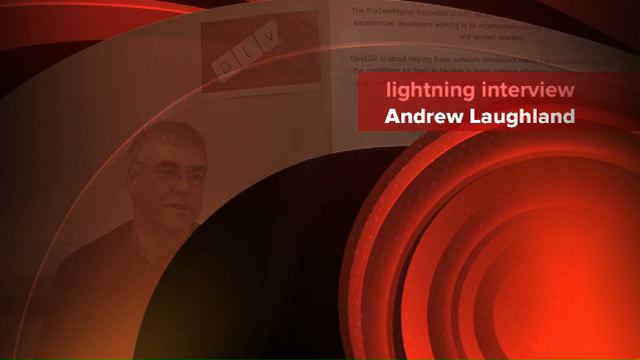Interviews with Innovators: Andrew Laughland
Using smart phones to improve data-gathering in academic research
Andrew Laughland (University of Hertfordshire) discusses the potential for academic researchers to transform data-gathering via smart phone technology. Recorded at Dev8D 2012, this interview explains how the rapidly increasing availability of smart phones presents researchers with opportunities to improve the reliability and scope of research data.
Conducted in support of the JISC Observatory and as part of our Interviews with Innovators series, this interview is available in video as well as audio format. See below our interview transcript.
Andrew Laughland is currently a doctoral student at University of Hertfordshire in the School of Psychology (with a first degree in Physics and Masters in Medical Physics). Previously he worked in the pharmaceutical industry and as a consultant assisting non-profit organizations and businesses with IT infrastructure, web presence, Web 2.0, Social Networking, RSS, podcasting and cloud computing.
Transcript: Lightning interview with Andrew Laughland
My name is Andrew Laughland and I am a Ph.D. student at the University of Hertfordshire in the School of Psychology. My first degree is in Physics and a Masters in Medical Physics and then a career in Health Physics, Health Information, and then the pharmaceutical industry with an IT focus.
Q: Could you tell us about an innovation that you believe will be important over the next 3 to 5 years?
My interest is in mobile phone technology, and some people would argue that’s not a new innovation. But my interest is in a new use of smart phones and smart phone apps. Typically the smart phone apps from the iTunes store or from Google are delivered to the customer and it’s about giving the experience to the customer in a game or in an app that helps the customer book something or find something. What I am interested in is an app that helps the researchers in the university to get information from people using the apps. So we use the fact that people are carrying smartphones around with them all the time, that they’re in their pockets and they can whip them out and give us some sorts of information, but rather than in being for their benefit it’s for the benefits of the researchers at the university.
Q: What do you see as the potential benefits of this?
A lot of what I have come across in Psychology has been done on paper, so there are studies looking at memory or experience of depressions, feelings or anxieties, and those typically require people to carry a little book around with them, and a pen in their bag and the risk there is that people don’t always record things or they record them without immediacy about when they record their information. So my thesis is that people carry phones around and they’re in their pockets; for eample, mine’s in my pocket at the moment, so I can just whip it out if there’s something that happens relevant to the study that I’m in. So I’m arguing that people can record data more quickly and have some benefits of a time-stamp on the data and I’m hoping that people will record more information as it’s made more convenient. And from a researcher’s point of view, researchers know that time that data was recorded and can be certain that it’s not recorded later in the evening or the day before they go in to see the researcher to hand the information back.
Q: Do you see examples of this happening now?
I think this is fairly novel. I think that, with thousands of apps out there, they all seem to be delivering the experience to the consumer and I have not seen a great deal of people using this to deliver the benefits to anyone of than the person using the app.
Q: What challenges do you foresee in the next few years?
I think the challenges at the moment are in the deployment to different platforms: the iPhone, Android, Blackberry, and then perhaps the Windows mobile phone. There’s quite a lot of work to deliver to multiple platforms but there are initiatives to make that easier. And I think that disappointment is that a lot of the mobile companies and the manufacturers seem to be suing each other and I think that’s constraining innovation and delaying the deployment of new technologies and ideas.
Q: If you have a magic wand, what would you change?
I think it comes back to that: make the legal patent issues go away and reduce the barrier to the development of the apps and the deployment of the apps. There is still quite a high learning curve in terms of delivering to an Android and then delvering to an iPhone, with different programming languages to learn and different gatekeepers and different things you have to get past in terms of the certification and approval process. The ideal is to make that much reduced and make it easier for researchers who are not IT professionals to create their data-gathering tools without having to go through a huge learning curve or pay a third party to build applications for them.
For more discussions of technical innovation in Higher and Further Education, see our Interviews with innovators and our complete list of podcasts available from UKOLN Innovation Support Centre.
Subscribe to our podcast feed to hear the latest from innovators discussing technical developments relevant to Higher and Further Education.






